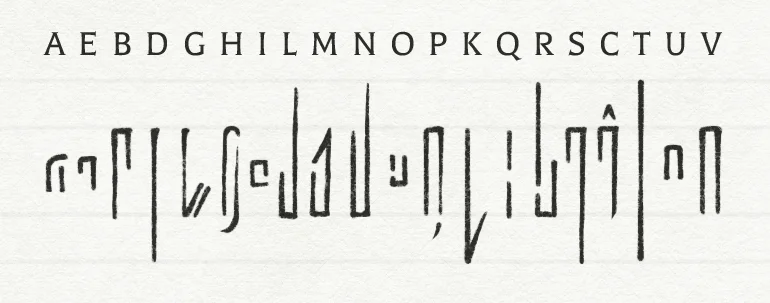Aiterean
The Common Tongue of Southern Lethea
We, the sons and daughters of the holy lake, accept the will of the Emperor of the North.
Cuairin, tel voiti u seiti al lāh ap, vliq hleiciq ue.
/ɕuɑ̯ˈirin tel voi̯ˈti u sei̯ˈti ɑl lɑːx ɑp vliʔ hlei̯ˈɕiʔ ue̯/
Origins
The Brelish are a people who stand apart from all their neighbours as their native tongue is a language isolate—having few to none similarities with the other languages of the world. Scholars suspect that the ancestors of the Brelish developed their language in relative isolation around lake Clēqhuap and the surrounding territories, remaining remarkably sedentary in their own homeland throughout the ages as little to no evidence of Aiterean's use predating its widespread adaptation after the spread of Hillenēq Hūril has been discovered.
Popularisation
Aiterean was the native language of Gilei Hillen, an Aprēan preacher and legendary leader who saved the world from a terrible aberati onslaught that threatened the survival of all of humanity. His and his companions sacrifice ensured mankinds victory and the belief of his ascension spread across the continent, leading to the rise of the Hillen's faith or Hillenēq Hūril. The use of Aiterean spread along with the new faith, first as a liturgical language, but over the centuries, as knowledge of the language improved, it had also found itself commonly used by merchants and diplomatic emmissaries throughout the continent, giving everyone a common language.International Language
Your iron is terrible for swords.
Vleinea īhai gev vlūn clui alaeti.
/vlei̯ˈneɑ̯ iːˈxɑi̯ gev vluːn ɕlui̯ ɑˈlɑe̯ti/
Accent and Status
Even when non-native speakers of Aiterean avoid their native loanwords, choosing to speak a purer form of the language, their accents can still result in issues with miscommunication, depending on how foreign the other person's pronunciation sounds to them. Those who speak with an accent more similar to that of the Brelish are viewed as more sophisticated, educated and higher class, although not everyone is familiar with how the language is actually supposed to sounds and so some have tried putting on posh accents to give others a perception that they are better than they are in reality.Difficult Pronunciation
Many of those who have learned the language have complained about various sounds or the combination of certain sounds that they've difficult. A common complaint is the glottal stop /ʔ/ or the trilled R sound /r/, but even the Brelish have disagreements over the various features of their phonetic inventory as some of them prefer tapped trills /ɾ/ instead or replace the harsher H sounds /x/ with a gentler voiceless glottal fricative /h/. Certain consonant clusters are also a source of pain for new learners, such as the 'rl' at the beginning of some words or 'lr' at the end.Plethora of Pronouns
Aiterean is a language that might lack grammatical gender for its words, but nevertheless, its pronouns are still gendered. While some languages are content with only having the third person pronouns express the individual’s gender, Aiterean also insists that people also refer to others in second person with a gendered pronoun. To add to the list of pronouns to learn, the language also has two separate first person plural pronouns, one which can be used to include the person who's being talked to while the other can do the opposite and exclude them instead. It is a pronoun that comes up often when certain groups seek to set up a clear boundary between them and the person who they're talking to either when bullying or discriminating in other ways. There are many who find the existence of the exclusory pronoun baffling as Aiterean is the language of Aprēa, a woman who preached love and acceptance, but the language of course long predated the Lady of the Lake, giving the scholars of today a hint of the cruelty that may have prevailed before her ascension.Dictionary
("Doralel ā vāil" - "I hugged her")
("Sleise kvē" - "Dark sky")
("Aepaiq sei" - "Soldier's daughter")
("Clada al Cladaq" - "Friend of a friend")
("Ve ā lū rlai cladaq" - "I am with my friend")
Numbers
Aiterean has a base-10 number system:2 - gē - /geː/
3 - hom - /xom/
4 - bik - /bik/
5 - ha - /xɑ/
6 - tveim - /tvei̯m/
8 - musa - /muˈsɑ/
9 - na - /nɑ/
10 - dep - /dep/
100 - gloinau - /gloi̯ˈnɑu̯/
1000 - kve - /kve/















Sounds like a cool language